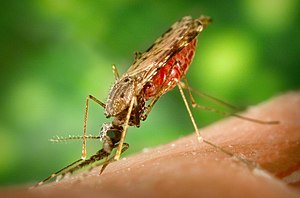 |
| Dr. Sukwa noted that continued progress towards ending malaria deaths can only be achieved through sustained funding. (Photo credit: Wikipedia) |
The 2013 is a critical year for malaria financing, says Dr. Thomas
Sukwa, World Health Organization, WHO, country representative in The Gambia.
“We now have the opportunity to work towards ending malaria once and
for all,” he said at a press briefing on Thursday, April 18, held at the
National Malaria Control Programme, NMCP office in Kanifing.
The briefing is part of activities marking this year’s World Malaria
Day, WMD, for which the topic is “Invest in Future: Defeat Malaria”.
Sustained funding
However, Dr. Sukwa noted continued progress towards ending malaria
deaths can only be achieved through sustained funding. Without which, he said, it
gains could be quickly reversed, putting millions of lives at risk.
Evidence has suggests that malaria control has a strong impact on
economic growth and provides a powerful incentive for increase investments,
according to the WHO. It said it is essential to maintain focus and attention in
the fight against malaria at this “critical moment”.
This, WHO said, must include ensuring it is retained through the
international development framework that will replace the millennium development
goals, the so-called post 2015 Agenda.
Opportunity
“We have the opportunity to end preventable childhood deaths and
economic instability caused by malaria, and the time is now,” Dr Sukwa said. “Never
have we made so much progress in fighting the disease, and never have we had so
much at stake to lose.”
Mr Balla Kandeh, deputy program manager NMCP, said WMD
represents a chance for all to make a difference, be it government, civil
society or individuals.
We can roll back malaria and help generate broad gains in health and
human development, he said.
He suggested that private sector in The Gambia should join the fight
against malaria. “The sector is the most competent to mobilize the much needed
resources to meet the challenges.”
Harmonize
In 2008, the world health assembly instituted World Malaria Day as an
occasion to harmonize global, regional, and country-level advocacy efforts to
maintain progress in prevention, diagnosis, treatment and control of malaria.
Historically, malaria was found in almost every country in the world after
the Second World War Today over 90 countries are malaria-free and an additional
26 are on route to achieving that status.
 |
| Malaria is preventable and curable (Photo credit: Novartis AG) |
Since 2000, over 1.1 million lives have been saved. Malaria mortality
rates in Africa have decreased by one-third, and global malaria mortality rates
have decreased by 26 percent, the WHO said.
Decline in funding
The track record shows that the fight against malaria is one of the
best investments in global health to date. In the process, new tools
(medicines, diagnostic techniques and approaches) have been developed to
support the global campaign to eradicate this killer disease.
However, the WHO noted that recent gains against malaria are
increasingly threatened by a decrease in funding, which is blamed on a global
economic crisis and donor fatigue.
Africa remains the most affected continent with 90 percent of malaria
deaths, of which, the majority occurring in children younger than five years of
age.
Though funding of around $4.4 billion have been mobilized from
international partners and African governments, the continent still needs to
mobilize an additional $3.6 billion to fully fund malaria control plans and
programmes from 2013-2015.
Africa’s contribution low
Africa’s domestic funding to malaria control stands at only 23 percent
in 2011 compared to Asia’s 43 percent and Latin America’s 86 percent, according
to WHO figures.
The WHO will led a three-year campaign to be launched on WMD under the
topic “Invest in Future: Defeat Malaria”, to address this funding gap.
The decrease in support for fighting malaria particularly in areas
where significant progress has been made has led to a resurgence of the
disease, thereby reversing years of efforts and investment.
Now, the WHO wants to stay on course as malaria resurgence will remain
a persistent threat until the disease is eliminated altogether.











No comments:
Post a Comment
The views expressed in this section are the authors' own. It does not represent The North Bank Evening Standard (TNBES)'s editorial policy. Also, TNBES is not responsible for content on external links.